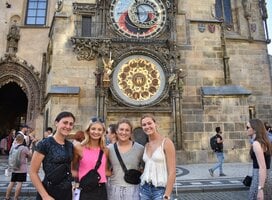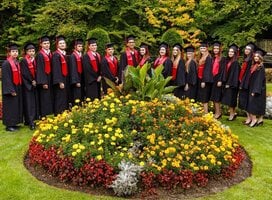High School Abroad in the Czech Republic
From its fairytale-esque medieval architecture, to the melting pot of cultures and religions influenced by bordering countries, the Czech Republic is definitely a great high school abroad option for students who are interested in immersing themselves in the history of Europe.
Studying or taking a gap year here can enable you to bring your textbooks to life by visiting the places you read about. You can focus on religious studies while walking through Prague’s Jewish quarter. History lovers can go back in time while learning about Central and Eastern Europe on a tour of one of the many castles in the Czech Republic. Literature enthusiasts can sit down and enjoy a warm café at one of the coffee shops where Franz Kafka wrote his famous stories.
The Czech Republic is great for students who: are interested in European and religious studies, love to explore buildings from the 1300s, and who can’t wait to try beef goulash.
If you’re interested in spending time abroad in the Czech Republic while in high school, you can choose from:
- A semester, gap year, or full year exchange
- A summer study abroad tour through Europe
High School Exchange
Live with a host family and attend classes alongside Czech high school students. While participating in a high school exchange program, you will get to focus on language immersion and cultural exploration, while living in a city like Prague or Brno, or a more rural village in Bohemia or Moravia.
Teen Travel Programs
While there aren’t any programs that spend time solely in the Czech Republic, many students opt to spend their summer in Europe on a program that allows them to experience and travel around more than one country.
With an academic component, you can participate in a summer study abroad program that will enable you to get to know the history and culture of the region. In addition to the Czech Republic, you’ll get to also spend time in Germany, Austria, Poland, or Hungary, depending on the summer program you choose.
Student Visa
Because the Czech Republic is part of the EU, short-term programs that last less than 90 days will not require a visa. Longer study abroad programs, like semester, gap year, or full year exchange programs will require a visa. The Embassy of the Czech Republic’s website provides the most current information on applying for a Czech visa.
All travelers entering the Czech Republic must have a passport that will be valid for at least six months after the entry date into the country.
Note: If you are studying in the Czech Republic via a program provider, they should provide you with visa assistance.
Housing
Students who study abroad in the Czech Republic during a semester or yearlong exchange will be paired up with a host family. Contrarily, students who do teen travel programs will share a hotel room with other people from their program as they travel throughout the region.
Finances
Flights to the Czech Republic range from $800 - $1,200 round trip depending on where you depart from. Some of the study abroad program providers even include airfare in their overall cost for the program.
The official currency in the Czech Republic is the Czech crown, also known as the Czech koruna. Currently, 1 dollar is equivalent to 24 Czech crowns, so make sure to hold onto those coins.
Unlike many other countries in Europe, the Czech Republic is not on the Euro, which means that currency exchange is typically in your favor. You can get a decent meal for around $10, or 250 crowns. To be safe, plan to budget about $200 for the week. To save money, you could always cook at home, or grab food to go from a grocery store. Lonely Planet is a good resource to learn about tipping in the Czech Republic.
The price of studying abroad in the Czech Republic will vary based off of the program you choose. Shorter summer study abroad trips can range from $4,000-$5,995 for two to three weeks. Longer study abroad exchanges range from $12,600 for the semester, to $14,700 for the year, including flights.
Packing Tips
The Czech Republic has four distinct seasons, so packing tips will vary based off of the weather, so think ahead and plan for rain or snow in advance.
Here are some things not to pack:
- High Heels – ladies, the cobblestone streets and high heels do not mix too well.
- Expensive straighteners/blow dryers- because the outlets in Europe are different, hair essentials like straighteners and blow dryers that use a lot of heat have been known to burn out.
- Clothes you think you will only wear once- space is your suitcase is valuable, after all.
What to pack instead:
- Comfortable shoes with supportive bottoms. Ladies, for fancier nights, try boots or wedges instead of heels.
- If you really want to bring your own hair essentials, look into buying a converter/adapter that will work in the Czech Republic. The standard voltage is 230V, which uses power socket type E. Many travelers recommend buying a cheaper straightener there instead, so that they don’t risk ruining their nice one.
- Plainer clothing that can be mixed and matched, and layered.
Heath
Prior to entering the Czech Republic, you must be caught up on all of your routine vaccines, such as measles, the chickenpox, and Hepatitis. For more information, see what the CDC has to say about the Czech Republic.
Food
If Czechs love two things, it's beer and meat. If you're of age, you can consume "pivo" (the Czech word for beer, which they often refer to as "liquid bread") -- if your host family and your program allow it, of course.
Beef goulash is a staple of Czech and Hungarian culture, so you will probably try that for dinner at some point. If you're a vegetarian (vegetariánský) or vegan, no worries, there are plenty of options for you too!
Safety
As far as safety goes, the only thing to be concerned about in the Czech Republic is pickpocketing. To avoid the chance of this happening to you, we recommend wearing a traveler's belt under your clothing, so that you can store important documents like a copy of your passport and cash, and being aware of your bags at all times.












